In 2025, choosing the right EMR software is essential for UK clinics that want to enhance workflows, reduce no-shows, and boost patient satisfaction.
According to NHS Digital, 86% of UK GP practices now rely on EMRs to enhance patient care and operational efficiency.
At Medesk, we empower hundreds of private UK clinics with a cloud-based EMR system designed for real-world needs—featuring automated appointment scheduling, CRM-powered patient follow-up, and robust analytics.
Unlike rigid legacy systems like Epic or Cerner, which can overwhelm smaller private practices, our guide highlights the top 10 EMR systems for 2025, tailored to physicians who want to attract new patients and seek automation and efficiency.
Learn how to simplify your practice workflow and free up more time for patients with Medesk.
Open the detailed description >>Why the Right EMR System Matters for Your Clinic
An electronic health record program is more than a digital replacement for paper charts—it’s a transformative tool for your practice. Here’s why it matters:
- Boost efficiency. Automate scheduling and billing to cut admin time by up to 30% (based on the Medesk internal data).
- Enhance patient care. Access real-time patient data for faster and smarter clinical decision support.
- Ensure compliance. Meet HIPAA, GDPR, MACRA, and MIPS standards effortlessly.
- Improve Revenue. Streamline billing to minimize errors and boost financial performance.
A mismatched EMR, however, can slow you down with clunky interfaces or poor support or even compromise patient outcomes. That’s why aligning your choice with your practice’s size, specialty, and clinical workflow-specific needs is critical.
Which EMR Systems Are Best for Small Clinics in 2025?
Below, we rank the top 10 electronic medical record software for 2025, based on user satisfaction (Capterra, Software Advice, American EHR), feature sets, scalability, and cost-effectiveness. Each entry highlights benefits, key features, pricing, and real-world feedback.
| EHR System | Features | Pricing | Scalability | User Ratings |
|---|---|---|---|---|
| 1. Medesk | Online booking, patient portal, medical CRM, analytics, reporting, billing, payment processing | $32/month for 3 users and 50 appointments | Suitable for all-sized medical practices | 4.6 |
| 2. Epic Systems | Comprehensive functionality, patient portal, remote patient monitoring | $1,200–$500,000 based on practice size | Designed for large healthcare organizations | 4.4 |
| 3. Oracle Ambulatory EHR | Interoperability, claim management, real-time analytics, AI tools | $5,000/provider/monthly | Best for medium to large outpatient practices | 3.8 |
| 4. NextGen Office | Revenue cycle management, patient portal, reporting, content workflows | $300/month | Designed for small medical practices | 4.0 |
| 5. Athenahealth | Integrated billing, telehealth, mobile accessibility, patient payment | $140 per month per provider | Suitable for small to medium practices | 3.8 |
| 6. eClinicalWorks | Scribe AI, bots for automation, scheduling, e-prescribing | $449 per month per user | Suitable for various sizes, including primary care to hospitals | 3.3 |
| 7. Practice Fusion | e-Prescribing, charting, labs/imaging, medical billing | $199/month/provider | Designed for small to medium-sized practices | 3.7 |
| 8. Veradigm EHR | Customizable workflows, integrated revenue cycle management, patient engagement tools | $59/month/prescriber | Designed for small to medium ambulatory practices | 3.5 |
| 9. Tebra Medical EMR | ONC-certified treatment plans, customizable templates, coordinated patient care, digital patient check-in | $250/month/provider | Designed for small to medium independent practices | 3.9 |
| 10. AdvancedMD | Population health reporting, EPCS, Task Donuts, e-prescribing | $429 per month | Suitable for various sizes, from physicians to healthcare executives | 3.6 |
1. Medesk. EHR System That Keeps Your Calendar Full
Starting price: $32/month for 3 users and 50 appointments. Free 15-day trial.
Capterra rating: 4.6.
Medesk empowers private UK clinics with a cloud-based EMR that simplifies workflows and boosts patient retention.
According to the platform's internal data, clinics using Medesk report a 28% reduction in no-shows within 60 days, thanks to automated reminders and CRM tools.
This all-in-one, award-winning software system allows you to manage your practice from any internet-enabled device:
- make patient appointments;
- conduct telemedicine consultations;
- automatically generate reports on clinic performance;
- get paid and pay your employees;
- delegate responsibilities and delight your loyal clients with promotions and gifts, sent in custom boxes.
These and other 20+ features are available from the first day of Medesk's free 15-day trial.
Key features:
- Keep your schedule full with online booking and patient portal.
- Medical CRM to build stronger patient relationships.
- Customizable EMR tools for specialty-specific workflows — no rigid templates.
- Get predictable revenue growth with advanced analytics and reporting features.
- Integrated billing and payment processing.
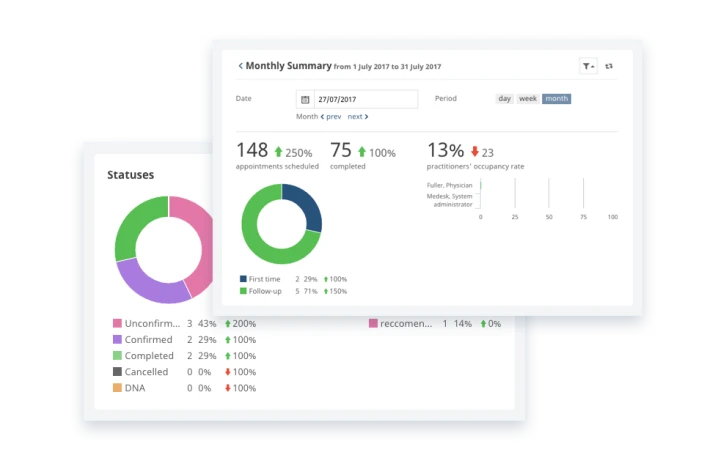
Users of Medesk practice management software emphasize the following advantages of the platform:
- User-friendly, even for non-tech-savvy staff, with 24/7 support and an extensive learning center.
- Unlimited users at no extra cost, perfect for growing practices.
- The powerful CRM and marketing modules allow you to get to know your customers and build strong relationships with them, promoting your brand and its recognition.
Medesk helps automate scheduling and record-keeping, allowing you to recreate an individual approach to each patient, providing them with maximum attention.
Learn more >>Some users note limited attachment capacity and implementation time. However, Medesk’s support team ensures a smooth transition and fast response to any questions.
“Medesk considers individual roles and responsibilities within the clinic and arranges everything in just the right way for patients, doctors, receptionists, nurses, and practice managers alike. From a marketing perspective, we benefit from the online booking and patient portal modules.” —Arman Ali, practice manager, Prime Clinic.
2. Epic Systems: Scalable Enterprise-Level EHR Built for Growth
Starting price: $1,200–$500,000 based on practice size.
Capterra rating: 4.4.
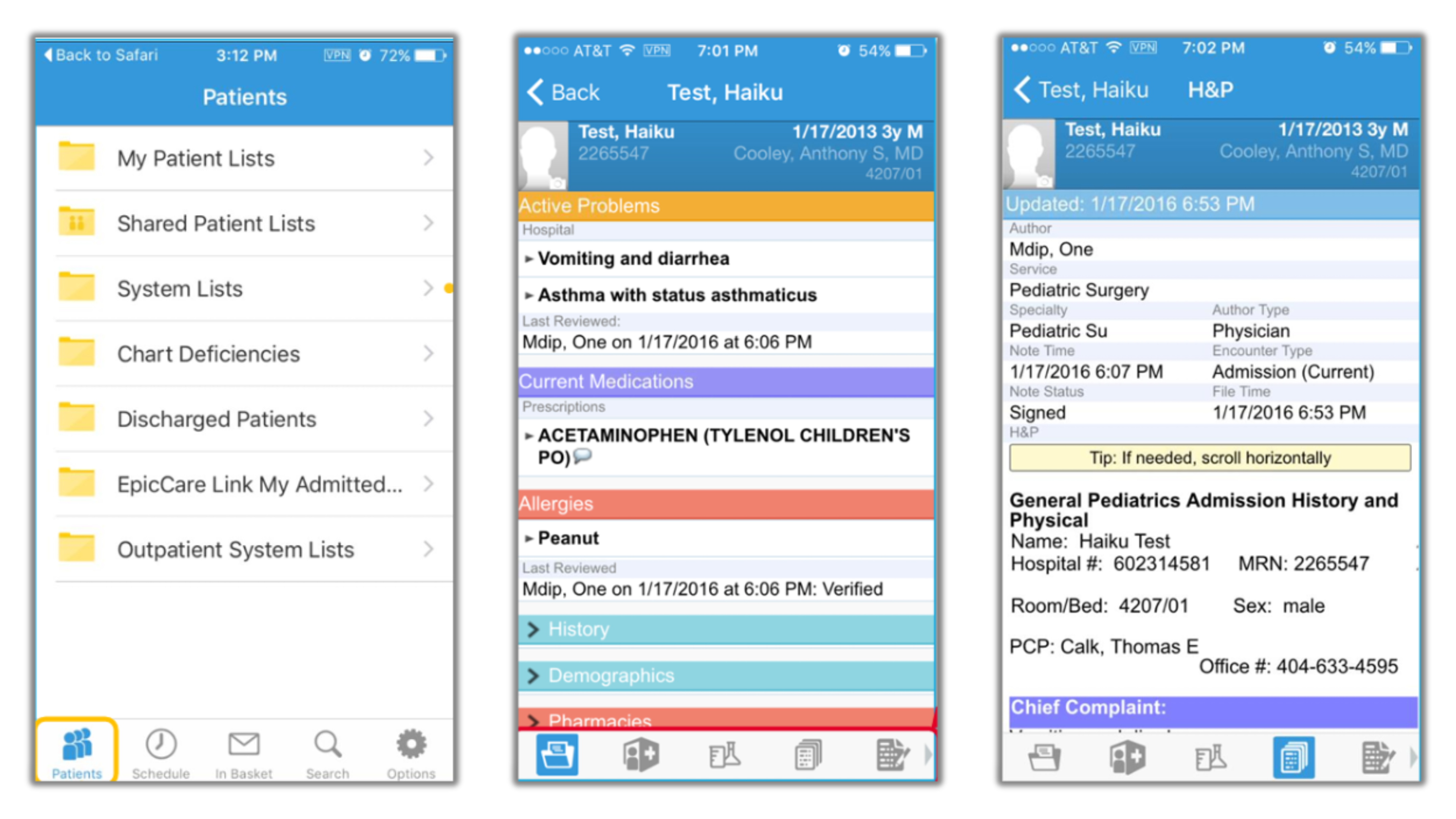
While costly, many small clinics find legacy EHR solutions like Epic rigid and overbuilt, slowing charting workflows. For large hospitals, however, Epic’s deep interoperability connects patient data seamlessly across care settings, enhancing continuity of care:
- communicate with the government and community partners;
- exchange electronic referrals;
- take care of your patients at home.
“Epic managed our 1,200‑bed hospital with zero downtime. The learning curve was steep, but the system’s reliability is unmatched.” — Shawnalee K., Billing Administrator.
Key features:
- Comprehensive interoperability for seamless data sharing.
- Patient portal for enhanced engagement.
- Remote patient monitoring and population health tools.
- Advanced analytics for population health.
Capterra users find this practice management solution very decent. Here are the pros:
- Handles large volumes of patient data efficiently.
- Easy switching between patient charts.
- Home-based workflows.
But the high cost can be prohibitive for smaller practices if compared with platforms like Medesk or Veradigm. Also, an outdated interface with an inconvenient multiple screens function can be frustrating.
3. Oracle Ambulatory EHR for Best Data-Driven Outpatient Care
Starting price: $5,000/provider/monthly.
Capterra rating: 3.8

Oracle Ambulatory EHR application is a data-driven app with powerful analytics and population health tools. It’s best suitable for outpatient care of physicians and clinics.
Traditional EMR note-taking feels tedious with unstructured templates. Oracle’s AI note-taking assistant and real-time analytics make documentation effortless, faster, smarter, and more personalized for busy outpatient clinics.
Key Features:
- Interoperability with inpatient systems.
- Predictable claim management with CMS-1500 support.
- Real-time analytics for population health.
- Chart up to 25% faster thanks to AI-guided templates and predictive code suggestions.
Ex-Oracle Cerner is well-known among common EMR systems in the US. The users value this EHR program for:
- easy navigation;
- patient portal;
- and interface capability with inpatient settings.
“Having used multiple EMR/EHR in the last 10+ years. Cerner is an improvement from the previous military EHR which was ancient. However there is still many features missing and requires so many clicks to get to the section or place you want versus other EHR systems.” — Anonymous nurse practitioner.
However, there's always a fly in the ointment. And sometimes you find several ones, like poor support and a steep learning curve.
4. NextGen Office: Patient-First EMR That Simplifies Documentation
Starting price: $300/month.
Capterra rating: 4.0
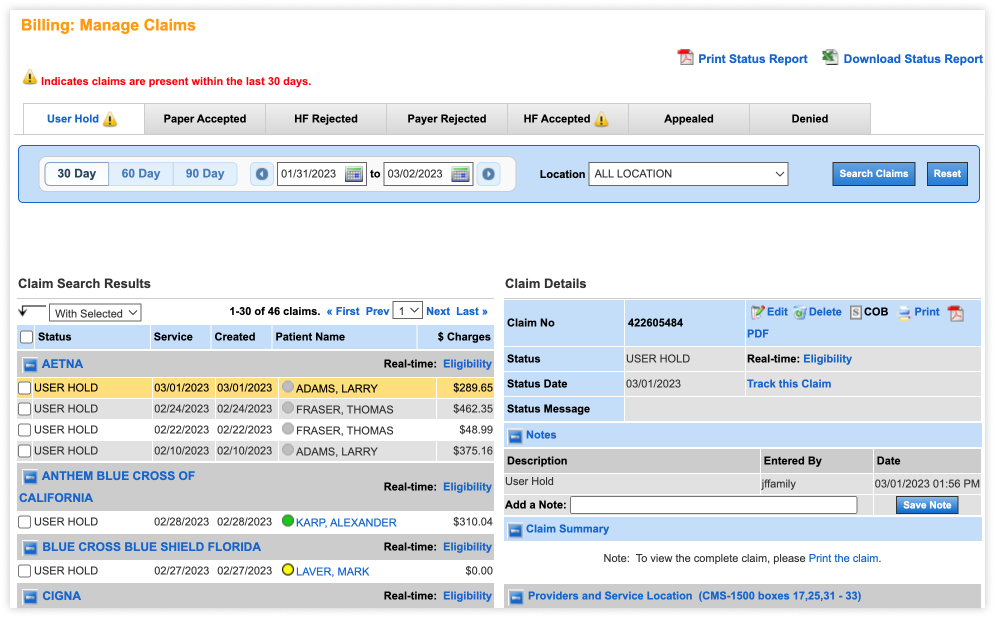
Chart faster with NextGen’s Ambient Assist AI for small practices.
NextGen’s cloud-based EMR streamlines documentation and revenue cycle management, though it lacks specialty-specific templates. This electronic medical record system is designed for:
- healthcare providers;
- billing and medical insurance companies;
- specialty practices;
- telehealth providers.
Key Features:
- Know what’s costing you money with revenue cycle management tools.
- Boost user engagement and satisfaction with a patient portal.
- SOAP notes generator saves up to 1 hour/day of charting.
There are more than 1000 NextGen reviews on Capterra and Software Advice. They vary much depending on the needs of a clinician and the size of his/her practice. Here is what professionals love about the NextGen electronic health record software:
- efficient employee tracking function;
- user-friendly interface with Avaya integration.
If you chart a lot, NextGen is a great tool. But pay attention that users have written about mistakes in reports and poor support to fix them.
“Used for several yrs and ultimately changed to MMA for EMR. Still use Nextgen for PM. Poor fit for dermatology. Not streamlined and efficient. Many clicks and scrolls to get through it.” — Michael B., dermatologist.
5. Streamline Scheduling and Patient Engagement with Athenahealth
Starting price: $140 per month per provider. No free trial.
Capterra rating: 3.8.
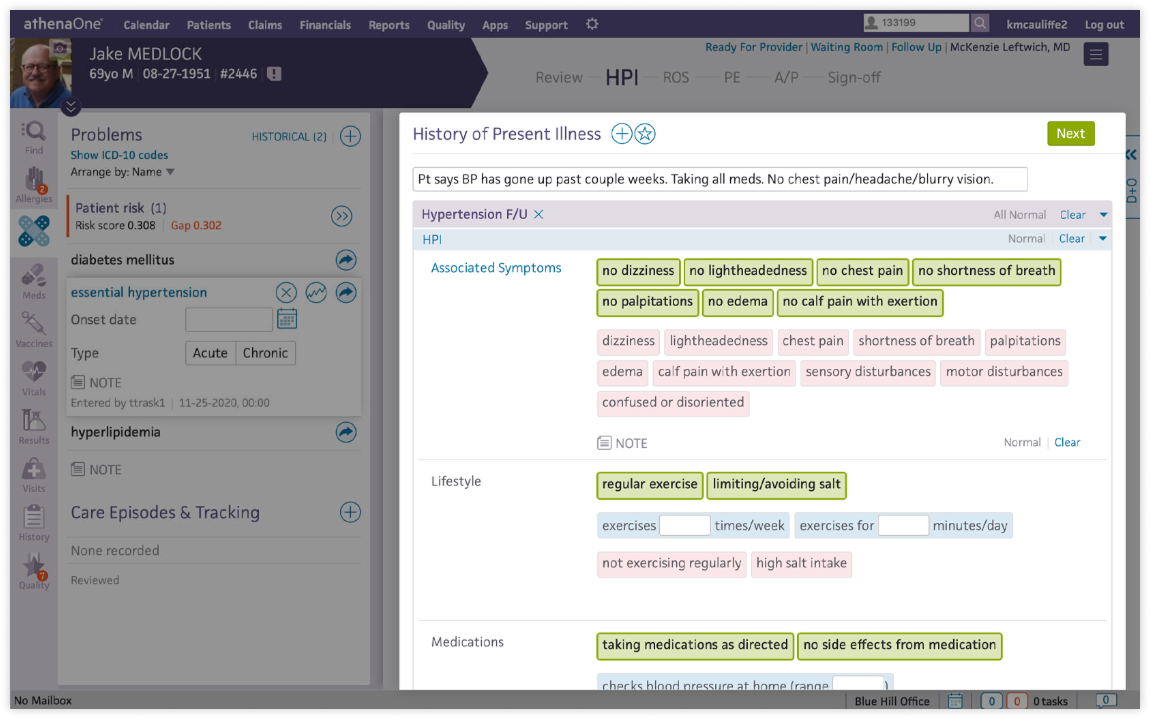
Boost patient engagement with Athenahealth’s intuitive scheduling and communication tools. AthenaOne’s cloud-based system simplifies appointment confirmations and patient communication, though charting can be cumbersome.
By implementing the software, you’ll get:
- easy appointment confirmations;
- aesthetically pleasing interface;
- responsive support manager.
“It served well for the time we used it, but our needs grew to needing features outside of what Athena could provide. Pros: The visual layout of seeing my client appointments in 1 day or 1 week.” — Courtney K., registered dietitian.
Key Features:
- Integrated billing for streamlined revenue.
- Mobile-friendly charting on tablets and smartphones—work on the go.
- Advanced patient portal for communication.
- Patient payment processing that reduces administrative tasks.
Among the common advantages of the AthenaOne medical EHR software we’ve pointed out:
- patient communication trail;
- adding new features in accordance with end users’ inputs.
The drawbacks can add up to some time for the onboarding and use of the AthenaOne electronic medical records system. Charting and billing processes can be slow with unpredictable downtimes. But if you don’t hurry, it’s ok.
Discover more about the essential features of Medesk and claim your free access today!
Explore now >>6. AI-Powered EMR Program for Busy Practices. eClinicalWorks
Starting price: $449 per month per user. No free trial.
Capterra rating: 3.3.

eClinicalWorks is an electronic medical record management system with robust telehealth and analytics capabilities. Automate repetitive tasks with its AI-driven bots and speech-to-text tools.
This EMR offers customizable solutions for primary care and surgical centers, though some features require paid add-ons.
Key Features:
- Automate 50% of routine data-entry tasks with built-in speech-to-text and workflow bots.
- E-prescribing and scheduling tools for faster workflows.
- Specialty-specific modules that suit different healthcare organizations. More specialities = more revenue.
This electronic medical records solution receives controversial reviews on Capterra and Software Advice. Some users value its speciality-specific modules, while others are shocked by the team’s attitude and multiple lags.
Pros:
- Color-coded scheduling for visual clarity.
- Affordable for basic patient management.
Cons:
- A lot of functions (clearinghouse, check-in) come only as paid add-ons.
- Excessive clicks for simple tasks.
“It's generally fast, and responsive for providers to put notes in. It does what it advertises. When adding printers, you have to restart the software. Support takes hours to return on tickets.” — Adrianna C., support desk.
7. Practice Fusion: Affordable Basics for Small Practices
Starting price: $199/month/provider. A free trial is available.
Capterra rating: 3.7.

Practice Fusion is one of the best electronic health records system designed to enhance operations of small to medium-sized practices. It’s HIPAA compliant from day one.
It offers core features at a reasonable price, though reporting lacks customization.
“It satisfied what we need in the initial months of our practice, but we quickly outgrew the software. The note taking was very clunky and took too long to complete a basic note.” — Ross K., owner and physician.
Key Features:
- E-prescribing and charting tools help you with the fast onboarding.
- Basic medical billing and invoicing to get started quickly.
- Improved patient experience with lab and imaging integration.
- Patient information access. Let your clients be engaged with their own health outcomes.
Practice Fusion’s clients agree that the value and offerings of the other competitors surpass the systems. However, it’s still one of the most popular EHR systems in the US. Compared with Medesk, the software lacks customizable reporting and layouts.
8. Coordinated Care Made Simple with Veradigm EHR (former Allscripts)
Starting price: $59/month/prescriber.
Capterra rating: 3.5.
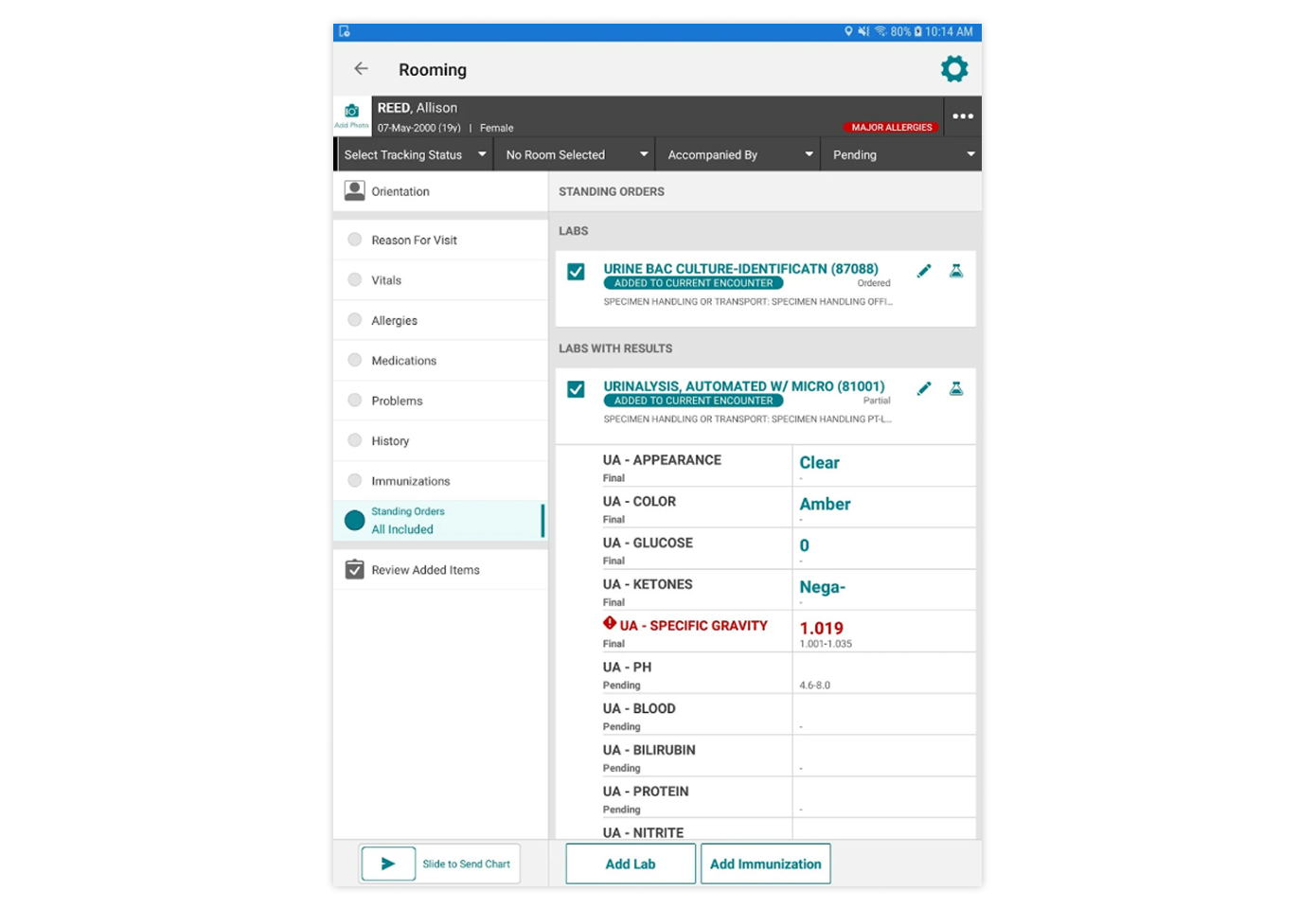
Routing faxes and template creation can be cumbersome. Veradigm’s interoperability and quick-access workflows speed up care coordination and streamline daily tasks. Veradigm excels in ambulatory care with quick prescribing; however, scheduling templates need improvement.
Key Features:
- Customizable workflows for efficiency.
- Every slot means revenue with integrated revenue cycle management.
- No need to be hands-on all the time thanks to patient engagement tools within the electronic health record system.
This cloud-based EHR has recently undergone the rebranding process. There are not so many user reviews on the upgraded version, but we accumulated everything we had found. Here is the verdict.
Pros:
- Very user-friendly, with quick access to all tabs.
- Great prescribing module.
Routing incoming faxes with lab results into the EHR is boring, but that’s what you are going to do at Veradigm. Not to mention the absence of advanced reporting tools different EMR systems have.
“Simple to navigate. Prescription status updates reach pharmacies swiftly. Sometimes it takes a while to load, and tech support seems limited.” — Leanne, medical practice owner.
9. Tebra: Seamless Billing for Independent Practices
Starting price: $250/month/provider. No free trial.
Capterra rating: 3.9.
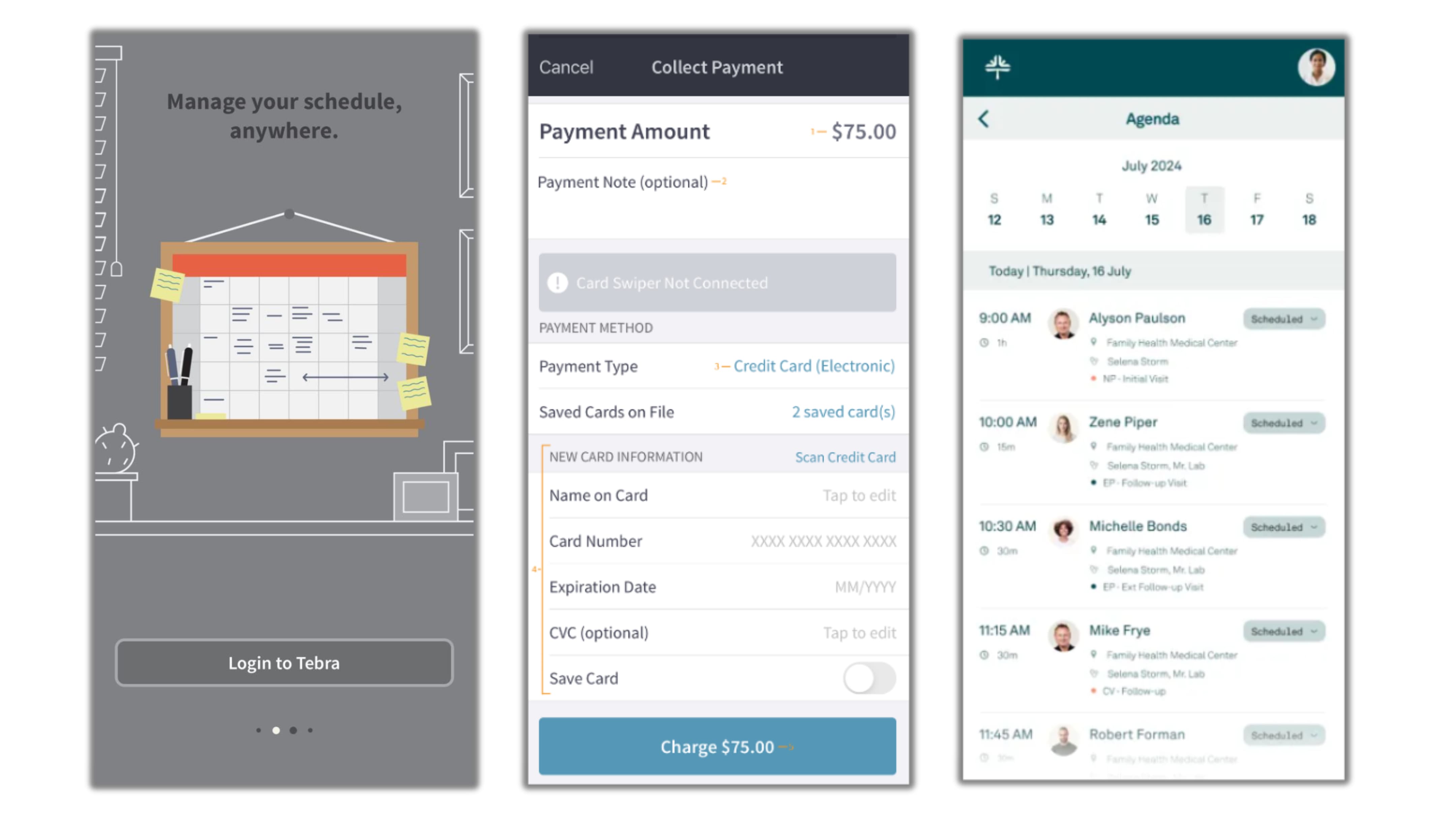
Tebra (formerly Kareo) is a health IT EMR platform for independent practices that integrates seamlessly with third-party products.
Its ONC-certified templates and check-in kiosks enhance patient experience and minimize admin errors. But be aware: automated messaging sometimes fails with multiple insurances.
“Tebra was very convenient for scheduling, uploading documents, and charging copays. Also billing was easier than current EMR system.” — Joanna G., billing specialist.
Key Features:
- Customizable treatment plans and text shortcuts make note-taking an easy process.
- Digital check-in and consent forms shorten wait times up to 20%.
- A billing dashboard with clear financial insights makes you stop guessing and start optimizing.
Financial performance is a strength of this electronic medical software, combined with committed customer support. It has fewer integrations than the competitors do, but you may not need them.
10. AdvancedMD Electronic Patient Record Software for Growing Practices
Starting price: $429 per month.
Capterra rating: 3.6.
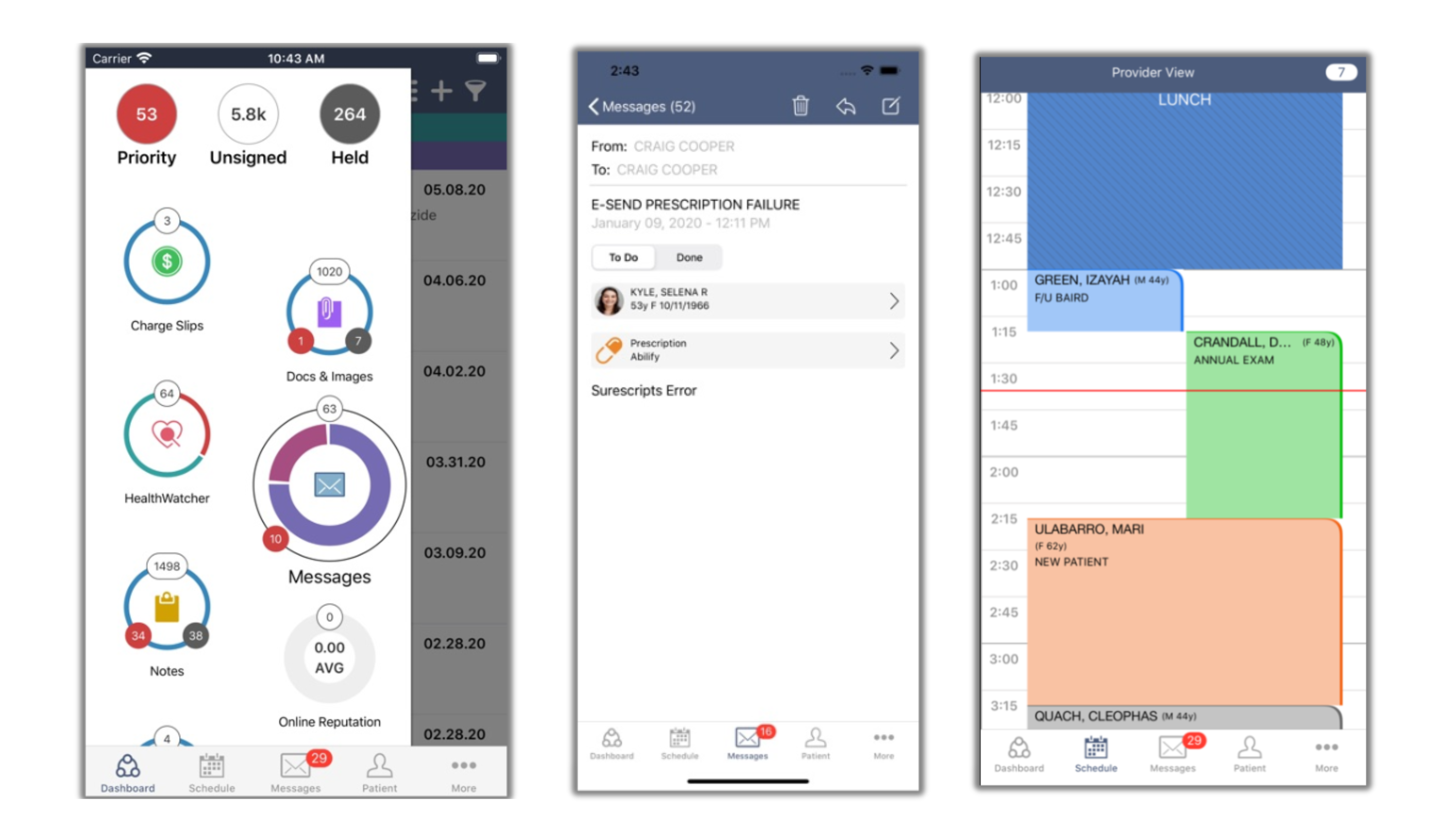
The last but not the least—AdvancedMD EHR. It’s a medical EMR system for physicians, physician executives, clinical managers, office administrators, healthcare executives, nurse practitioners, physician assistants and many more.
The lack of Android compatibility can hinder mobile access, but deep customization and charge entry tools support complex billing and unique workflows.
Key Features:
- Population health reporting and EPCS for e-prescribing.
- Unlike outdated systems, its drag-and-drop workflow builders suit every speciality.
- Mobile-friendly patient portal (iOS) gives your clients control over their treatment.
AdvancedMD sums up our top EMR systems list for a reason. It’s a popular choice in the USA and worldwide. The users appreciate it for tracking clientele visits for billing and well-functioning charge entry.
Nevertheless, there are some disadvantages, like disruptions during system upgrades and a substantial learning curve.
“I really like the ability to customize this product to fit your needs. It is also a very user-friendly software. The PM side is a bit complexed but manageable.”—Kelvin W., CEO, MD Owner.
What Features Should Clinics Look for in an EMR System in 2025?
When assessing different EHR systems, focus on these essential features to match your practice’s needs:
- Intuitive user interface. Shortens training time and boosts efficiency.
- Interoperability. Ensures seamless data exchange with labs and hospitals.
- Patient engagement tools. Offers portals, telehealth, and secure messaging to enhance care.
- AI and automation. Speeds up documentation and reduces admin tasks.
- Mobile accessibility. Enables flexibility on tablets and smartphones.
- Compliance and security. Meets HIPAA, MACRA, GDPR and MIPS standards.
- Scalability. Grows with your practice without costly upgrades.
Choosing the best EHR hinges on your practice’s unique needs. Prioritize affordability (e.g., Medesk, Practice Fusion), scalability (e.g., Epic, Oracle), or customization (e.g., AdvancedMD) based on your goals.
Use the comparison table and reviews above to guide your decision, and consider requesting demos or trials before committing.
How Can You Choose the Right EMR System for Your Private Practice?
Follow this step-by-step checklist to select the best EHR software that aligns with your clinic’s unique needs:
- Define your needs. Identify size, specialties, and patient volume to narrow feature requirements.
- Prioritize must-have features. List essential capabilities—e.g., automated scheduling, AI-driven documentation, and CRM for patient follow-up.
- Assess usability and onboarding. Choose a system with intuitive workflows and under 1 week of team training.
- Evaluate integration capabilities. Ensure seamless data exchange with labs, billing partners, and population health tools.
- Compare total cost of ownership. Calculate upfront fees, add-on modules, and maintenance to forecast ROI.
- Check compliance and security. Verify HIPAA, GDPR, MACRA/MIPS certifications and data encryption standards.
- Request live demos with real data. Test systems using your patient scenarios—Medesk offers no-code sandbox trials.
- Gather peer feedback. Read verified clinician reviews on platforms like Capterra to gauge real-world performance.
- Negotiate SLAs and support. Confirm response times, uptime guarantees, and 24/7 support availability.
- Plan for scalability. Choose a system that grows with your practice—look for unlimited user pricing or scalable tiers.
Why Medesk Stands Out in 2025
After evaluating the top EMR systems, Medesk emerges as a standout solution for UK private clinics seeking a blend of efficiency, personalization, and growth-ready features—with the emotional simplicity doctors appreciate.
- Chosen by hundreds of independent clinics across the UK, from mental health therapists to multi-specialty practices.
- Designed for small private clinics, with fast onboarding (under 1 week) and minimal training overhead.
- 94% user satisfaction rating, driven by intuitive scheduling, robust CRM tools, and responsive 24/7 support.
By focusing on operational outcomes—like no-show reduction and admin time savings—Medesk delivers predictable ROI and a smoother patient journey, making it a top choice for practices that value both clinical excellence and business growth.
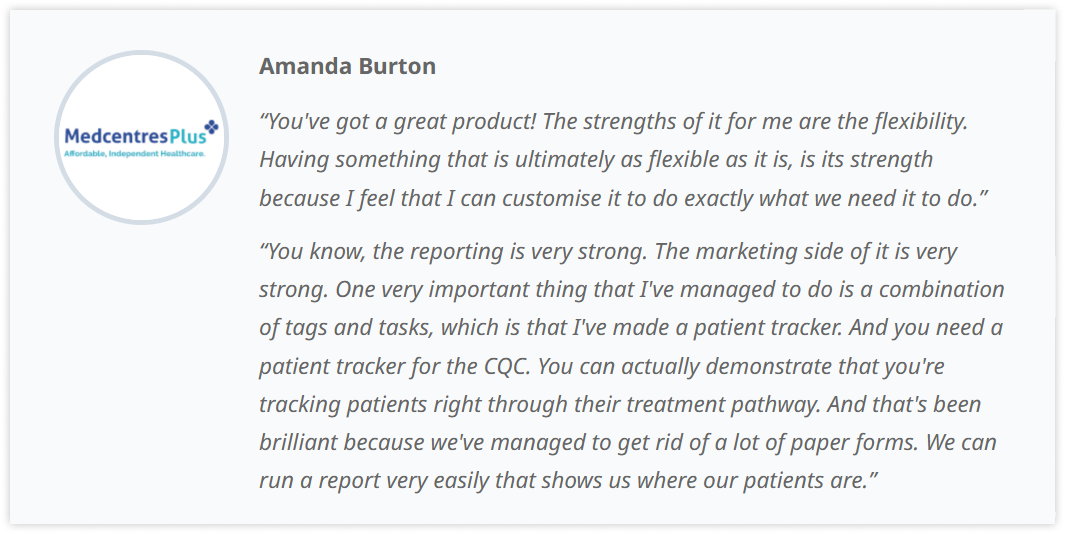
Start Medesk's free trial today and get 15 days of access to the advanced health record management system. See growth on the dashboard each week.
FAQ: Your EMR Questions Answered
Q1: What is the best electronic medical records system for private clinics in the UK?
For UK private practices, Medesk stands out by combining automated appointment scheduling, CRM-driven patient follow-up, and robust reporting—helping clinics reduce no-shows by 28% and boost patient satisfaction.
Q2: What are the top features to look for in an EMR?
Prioritize an intuitive interface, interoperability, AI-assisted documentation, patient engagement tools (portals, telehealth), and strong compliance standards (HIPAA, GDPR, MACRA/MIPS).
Q3: How do EMR systems help reduce no-shows?
Many EMRs, like Medesk and Tebra, include automated SMS/email reminders, digital check-in kiosks, and CRM campaigns that engage patients consistently before appointments, cutting no-shows by up to 30%.
Q4: How can I evaluate an EMR’s ROI?
Compare total costs—subscription, implementation, add-ons—against measurable benefits like admin time saved, reduced billing errors, and increased appointment utilization. Use pilot data to estimate impact.
Q5: Are demos and free trials available?
Yes. Systems like Medesk, Practice Fusion, and Epic offer sandbox trials or live demos. Always test with sample patient workflows to validate fit.
Q6: How can I migrate existing patient data and integrate with other systems?
Leading EMR vendors provide data migration services, supporting formats like CSV, HL7, and FHIR for seamless import of patient records, appointments, and billing data.
Medesk offers dedicated onboarding support with automated data mapping and API integrations with labs, billing partners, and population health platforms. We make sure that your legacy data transfers securely and your clinic’s workflows remain uninterrupted.


